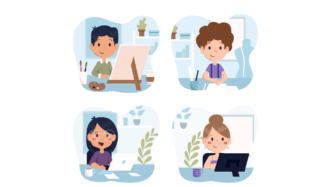LESSON OVERVIEW
In this lesson, students learn some informal expressions in English which are used instead of common phrases like ‘I understand’. They also watch two sets of short video clips, and practise using the new language.
INFORMAL EXPRESSIONS & VIDEOS
The lesson starts with a warm-up activity in which students discuss their knowledge of informal expressions in English. Then, they brainstorm colloquial ways of saying ‘I understand’, ‘I don’t understand’, ‘I’m not surprised’ and ‘You’re welcome’. After that, students watch the first set of short video clips and decide which of the four meanings from the previous exercise the actors express. Before watching the video for the second time, students complete gaps in some informal expressions (e.g. I feel you., Fair enough., Beats me.). Then, they watch the video and check their answers. Before watching the second video, students look at a set of expressions in context and decide what they mean (e.g. Much appreciated., I owe you one., Don’t mention it.). Next, they watch the video and decide which expressions were used.
MORE EXPRESSIONS & PRACTICE
This part of the lesson starts with pairwork. Students have to react to their partner’s statements but cannot use ‘Thanks’, ‘You’re welcome’, ‘I understand’, or ‘I don’t understand’. Then, they discuss the importance of learning informal expressions in English and decide which of the expressions they have so far learnt in the lesson they want to start using. Next, students look at short dialogues and replace the reactions with provided alternatives (e.g. No kidding!, Tell me about it!, Anytime.). After that, students get more practice by looking at some situations and explaining people’s reactions. Finally, students work in pairs and choose a topic from the list. Their partner should react using the informal expressions from the lesson, as well as adding any necessary details.
Subscribe to unlock these and many other Standalone lesson lesson plans with the Unlimited planWORKSHEETS













It seems to be a great lessons. Congratulations on the team!!! You are amazing!!!
Thank you, Erika!
I can’t open full lesson. I paid
Hi Narmin! You have a Premium subscription, and this lesson is only avalable for Unlimited users. You can browse the Premium lessons here.
Hello, does the video in ex. 3-4 correspond the task?
Hi, Hanna. The first video is for tasks 3 and 4, and the second video is for task 5 🙂
Hi, Hanna! You were right! The links in the pdfs were mixed up. They’re fixed now. Thanks for letting us know!
There’s a problem with the link in ex.3 and 4 – the video from ex.5 is attached to it.
Hi! Thanks for spotting that! It’s fixed.
My students are loving this LP. Congratulations to the creators! And thank you for your work!!
x
Thank you for your feedback! I’m glad your students like the lesson 🙂
Great! A very useful way to learn!
Thanks
Thanks, Mary!
I like the lesson except for using “sucks”. Of all the other terms there are in the English language I don’t think we need to teach our students this.
Sure, this might be your approach! The way I look at it is I prefer to teach students vocabulary that is being used and make sure they understand the connotation and the register. I know that the phrase ‘that sucks’ is sometimes perceived as a vulgar word, however, apparently it’s not true and it’s origins has nothing to do with any sexual acts (read this paper on the topic) (: All in all, we feel that this expression is used too often to be ignored and students should at least know what it means and how colloquial it is. But in the end, it’s their decision how they’ll use it.
We need more of such lessons about slang!
Hi, Polina. You will find more lessons on the topic of slang here. And more will come 🙂